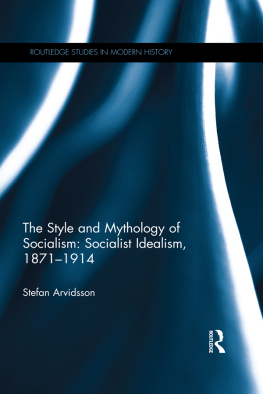Judt Tony. - Socialism in Provence, 1871-1914
Here you can read online Judt Tony. - Socialism in Provence, 1871-1914 full text of the book (entire story) in english for free. Download pdf and epub, get meaning, cover and reviews about this ebook. year: 2011, publisher: New York University Press, genre: Religion. Description of the work, (preface) as well as reviews are available. Best literature library LitArk.com created for fans of good reading and offers a wide selection of genres:
Romance novel
Science fiction
Adventure
Detective
Science
History
Home and family
Prose
Art
Politics
Computer
Non-fiction
Religion
Business
Children
Humor
Choose a favorite category and find really read worthwhile books. Enjoy immersion in the world of imagination, feel the emotions of the characters or learn something new for yourself, make an fascinating discovery.

Socialism in Provence, 1871-1914: summary, description and annotation
We offer to read an annotation, description, summary or preface (depends on what the author of the book "Socialism in Provence, 1871-1914" wrote himself). If you haven't found the necessary information about the book — write in the comments, we will try to find it.
Socialism in Provence, 1871-1914 — read online for free the complete book (whole text) full work
Below is the text of the book, divided by pages. System saving the place of the last page read, allows you to conveniently read the book "Socialism in Provence, 1871-1914" online for free, without having to search again every time where you left off. Put a bookmark, and you can go to the page where you finished reading at any time.
Font size:
Interval:
Bookmark:
Thank you for buying this ebook, published by NYU Press.
Sign up for our e-newsletters to receive information about forthcoming books, special discounts, and more!
Sign Up!
A publisher of original scholarship since its founding in 1916, New York University Press Produces more than 100 new books each year, with a backlist of 3,000 titles in print. Working across the humanities and social sciences, NYU Press has award-winning lists in sociology, law, cultural and American studies, religion, American history, anthropology, politics, criminology, media and communication, literary studies, and psychology.
SOCIALISM IN PROVENCE 18711914

18711914
TONY JUDT
A STUDY IN THE ORIGINS OF THE MODERN FRENCH LEFT

NEW YORK UNIVERSITY PRESS
New York and London
www.nyupress.org
2011 by the Estate of Tony Judt
All rights reserved
Library of Congress Cataloging-in-Publication Data
Judt, Tony.
Socialism in Provence, 18711914 : a study in the origins of the modern French Left / Tony Judt.
p. cm. Includes bibliographical references and index.
Originally published in Cambridge by Cambridge University Press, 1979.
ISBN 9780814743546 (pbk. : acid-free paper) ISBN 9780814743553 (e-book)
1. SocialismFranceProvenceHistory19th century. 2. SocialismFranceProvenceHistory
20th century. 3. PeasantsPolitical activityFranceProvenceHistory19th century. 4. Peasants
Political activityFranceProvenceHistory20th century.
5. Provence (France)Politics and government
19th century. 6. Provence (France)Politics and government20th century. 7. Provence (France)
Rural conditions. 8. Social changeFranceProvenceHistory. 9. SocialismFranceHistory.
10. New LeftFranceHistory. I. Title.
HX270.P76J83 2011
335.00944909034dc22 2010051544
New York University Press books are printed on acid-free paper,
and their binding materials are chosen for strength and durability.
We strive to use environmentally responsible suppliers and materials
to the greatest extent possible in publishing our books.
Manufactured in the United States of America
10 9 8 7 6 5 4 3 2 1
FOR PAT HILDEN IN RECOGNITION
PART ONE
THE VAR
PART TWO
WHY SOCIALISM?
PART THREE
POLITICS AND THE FRENCH PEASANTRY
MAPS
TABLES
This book is an enquiry into the origins of a political tradition. It seeks to investigate why the peasantry of Provence turned increasingly to the socialist movement in the period from 1880 to the First World War. This question is of interest not merely for a clearer understanding of an important characteristic of modern Francethe marked divergence in political traditions and affiliations between different regions, and the fidelity of French political allegiancesbut also as the basis for a redefinition of the history of socialism. The latter is commonly treated as either a development inherent in the emergence of an industrial proletariat or as mere ideological camouflage for the continuation of older patterns of protest and conflict by other means. By setting out to establish who socialists were, and exactly when and why they became politically committed, this study aims to contribute to a clearer view of the modern French left, as neither a victime du marxisme nor the latest in a succession of crypto-Jacobins.
Furthermore, by emphasising the extent to which socialist support came from the peasantry, I hope to rescue the latter from the twin identity usually ascribed to them: inherently conservative on the one hand, or ideologically nondescript on the other, following political movements with little concern for or interest in their content. Lastly, by limiting itself to a single period, and by stressing the importance of the events of that period, the book emphasises the centrality of a properly historical account of modern political divisions.
The book is arranged to respond to these concerns. nineteenth centuries. As a result, there is a wealth of historical and social background which may serve as a context for the study of the years after 1870.
Whereas .
Thus Parts One and Two are devoted to a study of the Var, moving from a description of the region through an account of economic and political developments at a particular moment and ending in an explanation of these developments and their relation to the period, the place and the ideas in question. , I have pulled together the various threads which can be traced through earlier chapters in an attempt to offer some thoughts upon the history of socialism in France.
It will be seen that the book thus falls into two very distinct sections, that which deals with the Var and that which offers more tentative and personal reflections upon certain key areas of modern French history. The two are not unconnected, however. The book was always conceived in the form of a response to a particular questionwhy did the Marxist left in France implant itself so successfully and enduringly in the rural areas of the country?and the order of the chapters is a reflection of my approach to answering this. Hence the choice of a limited region for close investigation, but .
Ideally, then, this book should be treated as a unity, in that it argues a thesis whose roots spread throughout the various chapters. The price paid for this approach is of course that any individual chapter, particularly the earlier ones, may seem occasionally opaque, depending as it does upon some later chapter for clarification of certain points. The alternative was to argue much of the thesis at each contentious juncture, which would have made for an even longer, as well as a very repetitive book. As it is, I have avoided the temptation to lead the reader by the hand through each stage in the argument, preferring to let my theme emerge as much through the arrangement of the material as from a reiteration of the case. Without in the least wishing to imply that I have dispensed with the apparatus of sociological or cliometric methodology only to lapse into literary structuralism, I would hope that by the time he or she reaches the conclusion, the reader will have been led by the form into an appreciation of the content. In the intellectual atmosphere of the late 1970s this would be the appropriate way in which to read the history of the French left.
Finally, to avoid or at least reduce confusion, I should add that I have referred to socialism or socialists when discussing either the idea, the complex of beliefs usually associated with the term, or those men and women who held them; where the reference is to Socialists, this denotes more specifically the political party which was formed in 1905, and its members and supporters. Because of the confusing multiplicity of parties and groups calling themselves socialist in the previous generation, I have tried to avoid ambiguity by keeping references to these in the lower case.
In the preparation of this book I have incurred many debts, to institutions and persons, and it is a pleasure to have the opportunity to acknowledge these, however inadequately.
The nature of the present study has meant frequent and often lengthy visits to France. These have at various times been supported by grants from the Centre National de Recherche Scientifique, the Political Science Fund of Cambridge University, and the Electors to Fellowships of Kings College, Cambridge.
Next pageFont size:
Interval:
Bookmark:
Similar books «Socialism in Provence, 1871-1914»
Look at similar books to Socialism in Provence, 1871-1914. We have selected literature similar in name and meaning in the hope of providing readers with more options to find new, interesting, not yet read works.
Discussion, reviews of the book Socialism in Provence, 1871-1914 and just readers' own opinions. Leave your comments, write what you think about the work, its meaning or the main characters. Specify what exactly you liked and what you didn't like, and why you think so.







